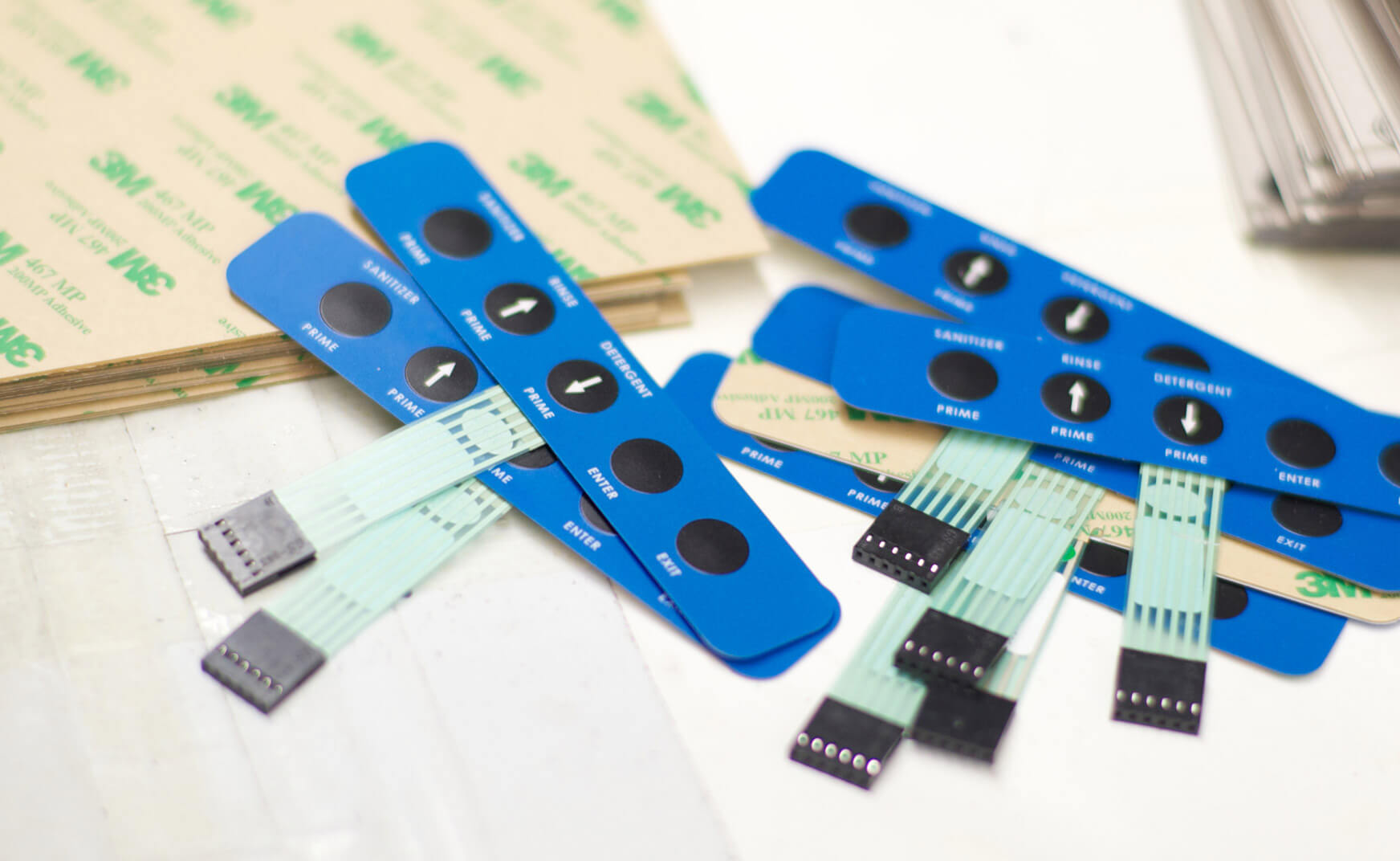Membrane Switches: The Best Choice for Compact and Reliable Controls
Membrane Switches: The Best Choice for Compact and Reliable Controls
Blog Article
Understanding the Significance of Membrane Switches in Individual Interfaces
Membrane switches are indispensable components in the layout of efficient individual interfaces, facilitating not only functionality but likewise boosting aesthetic charm and user interaction. As we explore the various benefits and future trends linked with Membrane modern technology, it becomes clear that these buttons are extra than just parts; they represent a merging of innovation and usefulness.
What Are Membrane Buttons?

The spacer layer, which has glue residential properties, permits the separation of the circuit layer from the overlay, ensuring that the button continues to be in a non-activated state until pushed. When pressure is put on the overlay, it compresses the spacer layer, linking the space and finishing the circuit in the underlying layer. This layout not only lowers the physical room required for standard mechanical switches but likewise boosts the longevity of the tool, as Membrane switches are generally immune to dirt, wetness, and other environmental variables.
Generally located in applications ranging from customer electronics to medical tools, Membrane buttons are indispensable to modern technology, offering a straightforward and reliable user interface that lines up with contemporary layout needs.
Benefits of Membrane Buttons
While various switch modern technologies exist, Membrane Switches deal distinct benefits that make them particularly desirable in various applications. One of the main advantages of Membrane buttons is their compact layout, which enables space-saving applications in tools where realty is restricted. Their thin account not just enhances visual allure yet additionally promotes lightweight construction.
Another considerable advantage is their resistance to ecological aspects. Membrane switches are commonly sealed against dampness, dust, and contaminants, making them optimal for use in demanding settings, such as medical devices and commercial equipment. This resilience prolongs the life-span of the button, lowering maintenance prices and improving dependability.
Additionally, Membrane buttons can be personalized to fulfill details design requirements, incorporating unique graphics and colors that improve customer interaction. Their tactile feedback options can also be customized to give a satisfying user experience. Furthermore, Membrane switches are cost-efficient, particularly in high-volume applications, as they can be generated successfully.
Applications in Various Industries

In the consumer electronic devices market, Membrane buttons are widespread in gadgets such as microwaves, washing machines, and remote controls. Their tactile comments and aesthetic alternatives enhance individual experience while giving a smooth, contemporary appearance. Furthermore, vehicle manufacturers make use of Membrane buttons in dashboard controls and infomercial systems, where space is restricted, and customer engagement is crucial.
Additionally, the commercial industry leverages Membrane buttons in control panels for equipment and equipment, enabling for intuitive operation in usually extreme environments. Their resistance see this to chemicals and wetness guarantees durability and reliability in these applications. Overall, the adaptability of Membrane Switches contributes significantly to their widespread use, making them essential in numerous technical domain names.
Layout Factors To Consider for Membrane Switches

When creating Membrane buttons, numerous crucial More Help considerations should be taken right into account to guarantee optimal capability and user experience. Firstly, the choice of products is essential; selecting resilient, premium substratums can improve the button's durability and resistance to environmental variables such as wetness and temperature level changes.
Second of all, the style of the visuals overlay need to focus on quality and ease of usage. Symbols and text must be readable, and the format needs to help with intuitive communication (membrane switches). Furthermore, responsive responses is essential; integrating a tactile dome or other systems can enhance the user experience by providing physical confirmation of activation
One more vital element is the button's electric performance. Developers have to make sure that the conductive traces are effectively designed to minimize resistance and stay clear of signal interference. This involves assessing the needed actuation force and making sure compatibility with the digital elements they will interface with.

Future Trends in Membrane Innovation
As modern technology proceeds to advance, Membrane switches are poised to advance dramatically, driven by technologies in products and making methods. One arising fad is the unification of innovative products, such as conductive inks and versatile substratums, which boost toughness and lower the total weight of Membrane buttons. These products not only improve the responsive response yet also permit the layout of switches that can endure harsher environmental conditions.
Furthermore, the combination of touch-sensitive technologies is transforming conventional Membrane Switches into more interactive individual interfaces. Capacitive touch sensing units embedded within Membrane button panels can supply a more responsive and instinctive individual experience, straightening with the go now expanding demand for smooth, contemporary layouts in customer electronic devices.
Furthermore, developments in printing methods, such as digital and 3D printing, enable rapid prototyping and customization of Membrane buttons. This adaptability enables manufacturers to respond faster to market needs and consumer preferences.
Lastly, sustainability is coming to be a significant focus, with manufacturers checking out environmentally friendly materials and processes. As these trends unfold, the future of Membrane technology assures boosted functionality, visual allure, and environmental responsibility, strengthening their role in innovative interface throughout different industries.
Verdict
In final thought, Membrane Switches stand for a vital part in the design of user interfaces, combining performance with visual versatility. As innovations in modern technology proceed, the development of Membrane buttons is expected to more improve user interfaces, driving innovation and boosting usability in an increasingly complex technical landscape.
Membrane switches are integral elements in the design of reliable individual interfaces, helping with not only functionality but additionally enhancing visual appeal and customer communication.Membrane Switches offer as a vital part in various customer interfaces, helping with a seamless interaction in between individuals and digital devices.While various switch technologies exist, Membrane Switches deal distinct advantages that make them specifically desirable in numerous applications.Moreover, Membrane buttons can be tailored to satisfy details layout needs, including unique graphics and colors that boost individual interaction.In verdict, Membrane Switches represent an essential element in the design of user interfaces, incorporating performance with aesthetic flexibility.
Report this page